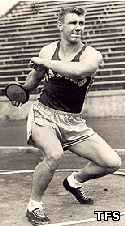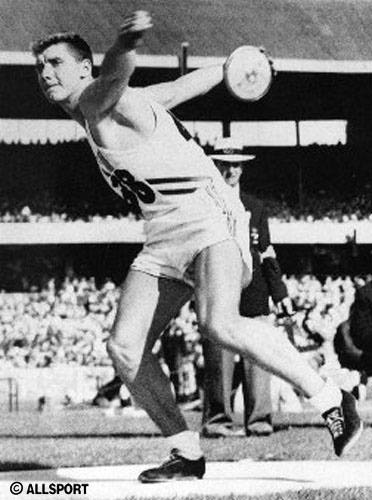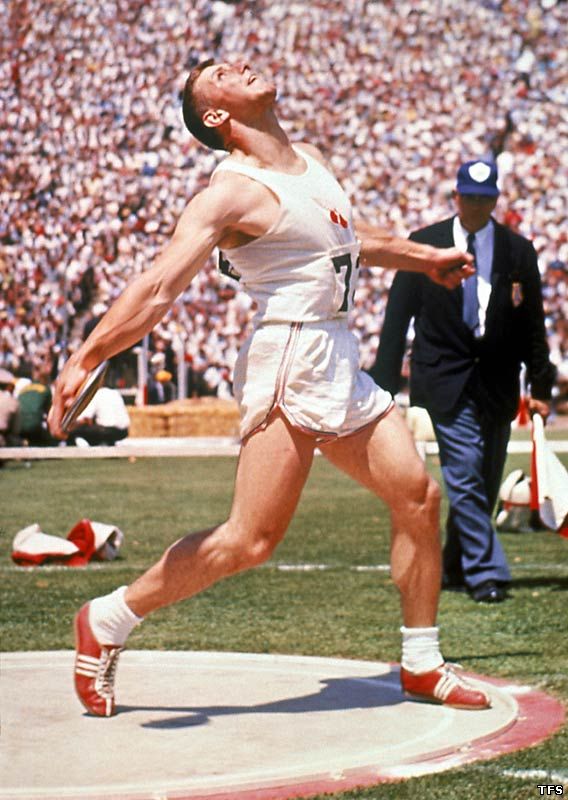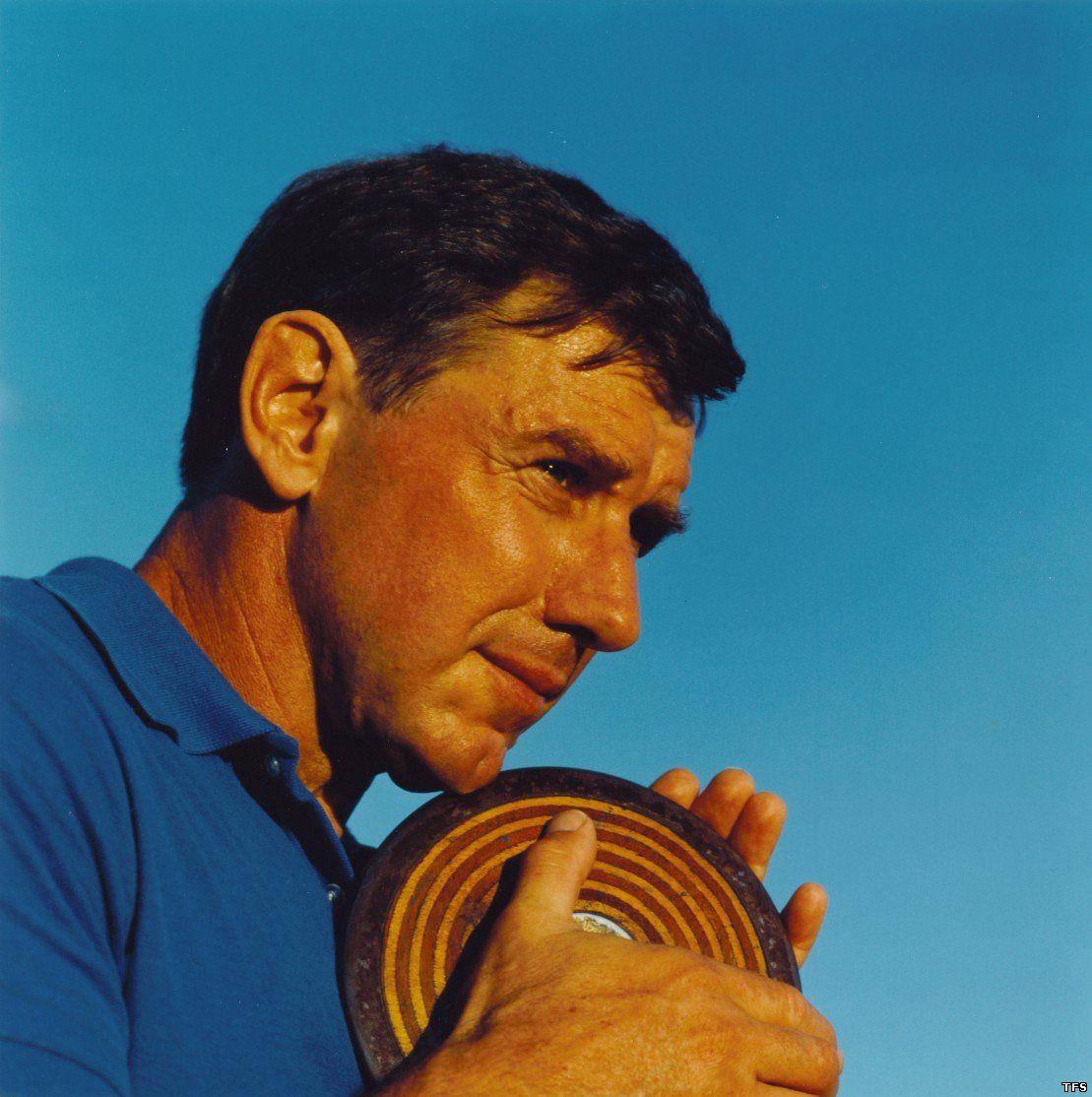Thursday, 2026-02-26, 6:45 AM
Welcome Guest |
|
|
Publisher
Al Oerter
Few considered discus thrower Al Oerter (USA-September 19, 1936 – October 1, 2007) a threat at the 1956 Olympics in Melbourne - Australia, where his Olympic career started, event though the 19 years old had said he hoped to compete in three Olympic Games before he retired. That prospect chilled his rivals after he captured the gold with an Olympic Record on his first throw (56.36 m). He said: " I don't know how I did it! Everything just went right and this throw came out!".
 In 1957, it appeared that Oerter's career would be over at the age of 20, when an automobile accident nearly killed him! He had dislocated a cervical vertebra and torn cartilage in his lower rib cage. He was ordered by doctors to stop training six days before the competition: the 1960 Olympic Games. In the qualifying round, he cast off his neck brace, ignored the pain that crippled his form, and hurled an Olympic Record of 60m54! Then he came from behind in the final for an unmatched third gold, saying: "These are the Olympics. You die for them." During the early 1960s, Oerter continued to have In 1957, it appeared that Oerter's career would be over at the age of 20, when an automobile accident nearly killed him! He had dislocated a cervical vertebra and torn cartilage in his lower rib cage. He was ordered by doctors to stop training six days before the competition: the 1960 Olympic Games. In the qualifying round, he cast off his neck brace, ignored the pain that crippled his form, and hurled an Olympic Record of 60m54! Then he came from behind in the final for an unmatched third gold, saying: "These are the Olympics. You die for them." During the early 1960s, Oerter continued to have  success, setting his first world record in 1962. In the process, he was the first to break 200 feet in the discus. He was considered a heavy favorite to win a third gold medal at Tokyo in 1964. Injuries again seemed to have felled Oerter before the Games. He was bothered by a neck injury then he tore cartilage in his ribs shortly before the competition. Competing in great pain, Oerter set a new Olympic standard and won a third Olympic gold medal despite not being able to take his last throw due to the pain from his ribs. As before, he bettered his own record with a throw of 61.00m. In 1968, at age of 32, Oerter returned to the Olympics at Mexico City, where many felt that Oerter, at this age, was finished since he never thrown as far as Jay Silvester. Oerter performed his best ever, winning the Mexico City gold with a 64m78. His Rival Silvester admitted: "When you throw against Oerter, you don't expect yo win. You just hope." He became the first track and field athlete to win four consecutive gold medals. success, setting his first world record in 1962. In the process, he was the first to break 200 feet in the discus. He was considered a heavy favorite to win a third gold medal at Tokyo in 1964. Injuries again seemed to have felled Oerter before the Games. He was bothered by a neck injury then he tore cartilage in his ribs shortly before the competition. Competing in great pain, Oerter set a new Olympic standard and won a third Olympic gold medal despite not being able to take his last throw due to the pain from his ribs. As before, he bettered his own record with a throw of 61.00m. In 1968, at age of 32, Oerter returned to the Olympics at Mexico City, where many felt that Oerter, at this age, was finished since he never thrown as far as Jay Silvester. Oerter performed his best ever, winning the Mexico City gold with a 64m78. His Rival Silvester admitted: "When you throw against Oerter, you don't expect yo win. You just hope." He became the first track and field athlete to win four consecutive gold medals. With a full-time job and a young family, Oerter retired in 1969. Amazingly, his lifetime best of 69.46 came 11 years later in his "second" career at 43 years old. At the 1980 Trials, with the American boycott looming, Oerter finished fourth. In 1984, at age 45, he missed the Trials with an injured Achilles, but he carried the flag for the 1984 summer Olympics. Finished? In 1993 threatened to try for Atlanta at age 60. "I miss going for something exclusive," he said. Finally he carried Olympic flame into the stadium for the 1996 Olympic Games. With a full-time job and a young family, Oerter retired in 1969. Amazingly, his lifetime best of 69.46 came 11 years later in his "second" career at 43 years old. At the 1980 Trials, with the American boycott looming, Oerter finished fourth. In 1984, at age 45, he missed the Trials with an injured Achilles, but he carried the flag for the 1984 summer Olympics. Finished? In 1993 threatened to try for Atlanta at age 60. "I miss going for something exclusive," he said. Finally he carried Olympic flame into the stadium for the 1996 Olympic Games.  Oerter had struggled with high blood pressure his entire life, and in the 2000s, Oerter became terminally ill with cardiovascular disease. On March 13, 2003, Oerter was briefly clinically dead; a change of blood pressure medications caused a fluid build-up around his heart. As Oerter's condition progressed, he was advised by cardiologists he would require a heart transplant. Oerter dismissed the suggestion. "I've had an interesting life," he said, "and I'm going out with what I have." Oerter died on October 1, 2007 of heart failure in Fort Myers - Florida. Oerter had struggled with high blood pressure his entire life, and in the 2000s, Oerter became terminally ill with cardiovascular disease. On March 13, 2003, Oerter was briefly clinically dead; a change of blood pressure medications caused a fluid build-up around his heart. As Oerter's condition progressed, he was advised by cardiologists he would require a heart transplant. Oerter dismissed the suggestion. "I've had an interesting life," he said, "and I'm going out with what I have." Oerter died on October 1, 2007 of heart failure in Fort Myers - Florida.Quotes:
-I don't compete with other discus throwers. I compete with my own history.
-I don't think the discus will ever attract any interest until they let us start throwing them at each other.
-I never set out to beat the world. I just set out to do my absolute best.
-To exercise at or near capacity is the best way I know of reaching a true introspective state. If you do it right, it can open all. kinds of inner doors.
|
| Category: Legends | Added by: krystel (2010-08-19)
|
| Views: 2452
| Rating: 5.0/6 |
Recommend Entry to a Friend:
|
| | Total comments: 0 | |
|
|
|
|
|
|

| Our Partner
|

|
|
| Statistics |
Total online: 1 Guests: 1 Users: 0 |
|
|

